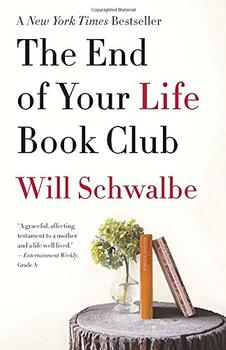Summary | Excerpt | Reading Guide | Discuss | Reviews | Beyond the Book | Readalikes | Genres & Themes | Author Bio

But in the midst of all the shore dinners and boat rides and enjoying Maine sunsets with a drink firmly in hand, all the adults, especially Dad, noticed how much Mom was struggling, a fact she was determined no one should acknowledge until the weekend was over.
She looked increasingly drawn and weary. Her skin wasn't more yellow, but she was thinner and her face was more creased; her cheeks sagged, making her perpetual smile seem slightly pensive. Still, all the lines seemed to disappear when the grandchildren marched in front of her on one mission or another. During that trip, Mom turned to me one evening and said that it was hard to imagine herself or ourselves any luckier.
What had gone so terribly awry for the people in McEwan's On Chesil Beach, one character thought, was that they'd never had love and patience at the same time. We had both.
The last morning of our stay, which was in a sprawling, shingle-style, classic Maine hotel, I came down to find Mom on the porch with the four younger grandchildren around her. She was reading them a story. It was a crisp Maine summer morning. I pulled out my iPhone and hastily snapped a few pictures. I remember realizing that Nico, the oldest grandchild, wasn't in the picture. I mean, why would he be? At sixteen, he wouldn't have been listening to his grandmother reading a picture book.
I ran to his room and told him I needed him - so he unplugged himself, put down his own book, and followed.
We walked together to the porch, and then Nico joined the crew so I could get a picture of Mom with all five of her grandchildren. I'm not sure why I felt compelled at that moment to do it. I never take photographs. Maybe I sensed that something was about to happen beyond the control of love, patience, or any of us, and this was my last chance to fix time.
The final weekend of the summer, mid-September, my partner, David, and I spent with a friend who always rented a particular house on the beach in Quogue, about two hours from Manhattan, on Long Island.
Mom loved when I told her about visiting this friend, because the house belonged to John O'Hara's daughter, Wylie, and to O'Hara himself before that. O'Hara was one of Mom's favorite authors. The house was a ramshackle Cape on a rapidly crumbling bluff overlooking the beach and ocean, and it had the perfect porch for lying around and reading. Not surprisingly, the bookshelves were filled with John O'Hara books. On this visit, I'd decided to cheat on the book I'd brought and read O'Hara instead.
First, though, I'd figured I better find out a bit about O'Hara. I learned from books in the house that O'Hara was born in 1905 in Pottsville, Pennsylvania. His father was a distinguished Irish doctor, and the family was able to send him to Yale. But his father died when he was at college, and his mother couldn't afford to continue to pay his tuition, so that was the end of Yale for him. The experience of having to drop out gave O'Hara a lifelong obsession with money, class, and social exclusion. He first drew notice in 1928, during Mom's parents' era, writing stories on these themes for The New Yorker, and then, in 1934, at age twenty-nine, he wrote Appointment in Samarra, which made him famous. Mom said that O'Hara was, at first, someone she was told she should read and then soon became someone whose books she eagerly awaited.
When I got back to the city after my Quogue weekend, my father was in the hospital with septic bursitis in his elbow, having let it swell to the size of a small grapefruit before Mom made him seek emergency-room treatment. I called Mom to get the update. He hated being in the hospital, but he was doing well.
"So I finally read Appointment in Samarra," I told her."I'd always thought that book had something to do with Iraq."
Appointment in Samarra is not set in Samarra or anywhere else in the Middle East but in the fictional town of Gibbsville, Pennsylvania, in the 1930s. The novel tells the story of a young married car dealer named Julian English, who thinks he has all the right breeding and connections and who impulsively throws a drink in the face of a wealthier and more powerful man whom he loathes for no good reason. Three days later, and after two additional impulsive acts - including making a pass at the girlfriend of a gangster - Julian has lost literally everything.
Excerpted from The End of Your Life Book Club by Will Schwalbe. Copyright © 2012 by Will Schwalbe. Excerpted by permission of Knopf. All rights reserved. No part of this excerpt may be reproduced or reprinted without permission in writing from the publisher.




If passion drives you, let reason hold the reins
Click Here to find out who said this, as well as discovering other famous literary quotes!
Your guide toexceptional books
BookBrowse seeks out and recommends the best in contemporary fiction and nonfiction—books that not only engage and entertain but also deepen our understanding of ourselves and the world around us.